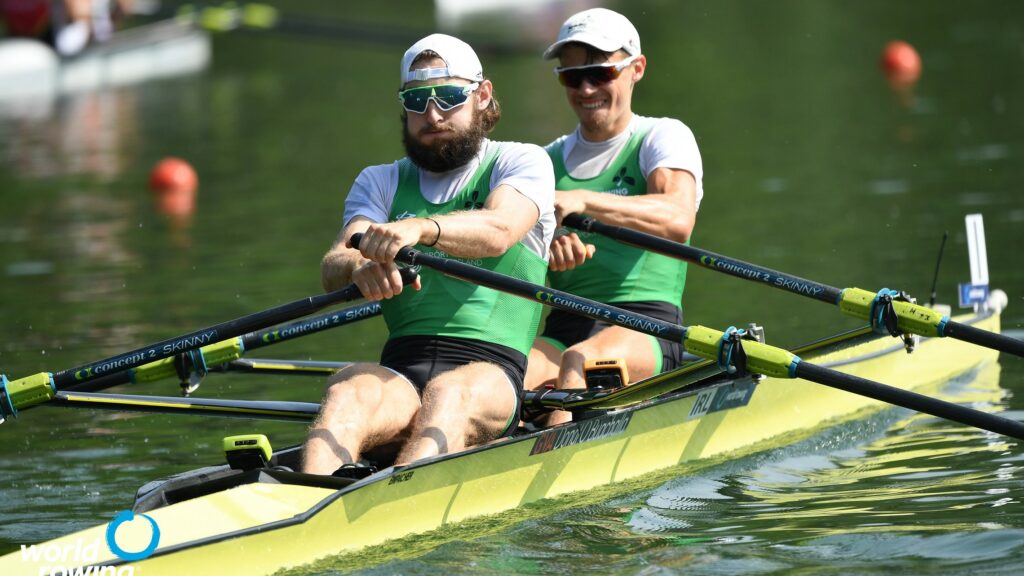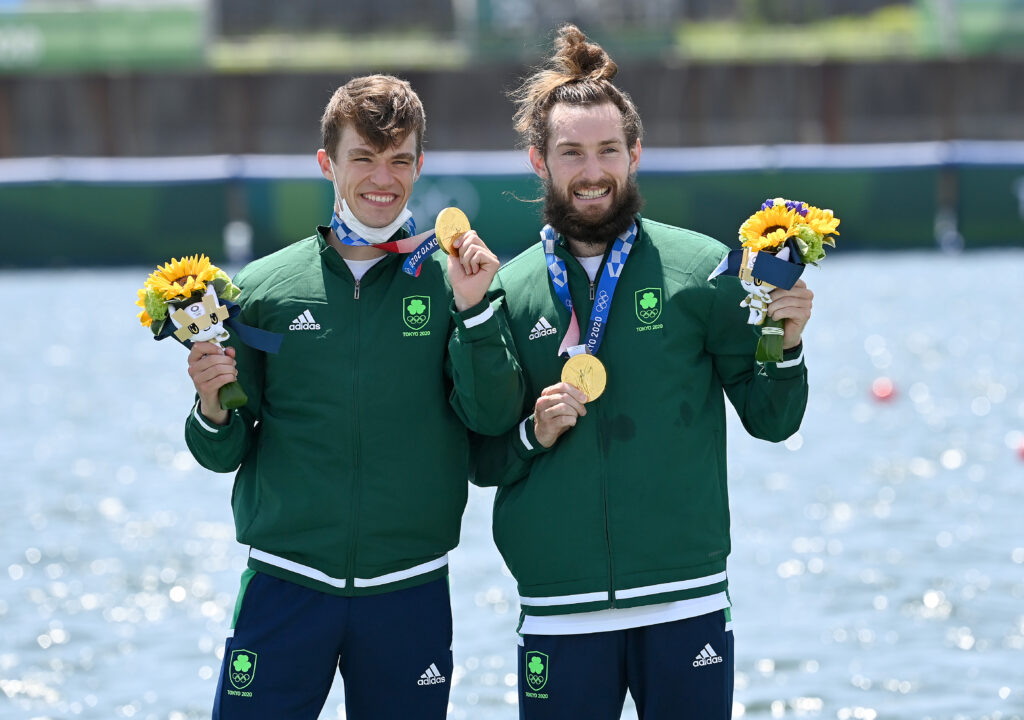
02 May 2022
Munich 2022: Battle of the Skibbereen Brothers
This article was originally featured on Munich 2022, and has been shared with permission of the Munich 2022 organising committee.
Published on 22 April 2022
By Catiana Rettenberger
“I wouldn’t even call it a town, let alone a city,” says rower Fintan McCarthy laughingly when describing his hometown Skibbereen in Count Cork (population 2,700). Nevertheless the 25-year-old Irish rowing star came to worldwide fame when he crowned himself World Champion in 2019 and Olympic Champion in 2021 in the lightweight men’s double sculls alongside Paul O’Donovan. We talked to the elite athlete in an exclusive interview.
His two siblings say that McCarthy was horribly unathletic as a child. No matter if football, Gaelic football or any other sport, he seemed to just not be the sporty type. “I was so bad at everything else.” Unlike his twin brother Jake, who McCarthy says was great at all sports, but we will talk about him a bit later.
In the end, McCarthy did find a sport that suited him at the age of 15. “I kind of just stumbled across it as something I actually enjoyed and was kind of good at. It kind of just went from there really.” He doesn’t see his late start as a disadvantage, however. “It probably, kind of, fast tracked me, because I was at that age, where I had to learn pretty quickly.” He skipped the years of only practicing for the fun of it and went straight to proper training. In less than two years he caught up to his peers and would soon surpass them.

THE ART OF ROWING
To him the reward for training is linear: “The more work you do, the better you get.” It’s fascinating to him, that there’s always room for improvement, always a way to get better, as perfection is unattainable. For example, it’s quite hard to steer in a perfectly straight line. Therefore, rowers equalise the boat by going harder with one oar than the other. In larger boats one rower has a rudder attached to their foot, which they can control by moving it.
At the face of it, the sport is very straightforward. In rowing “you just have to get to the finish line before the other boats, it’s just like a normal race. But the only thing is you’re racing backwards so you can’t see where you’re going. But the good thing about it is that you can see your opposition.” Being able to see how far ahead you are is a great motivator for the Irishman.
SKIBBEREEN ROWING CLUB
Being able to represent his community, “friends and family really, because everyone is so close knit,” is an added bonus and extra source of motivation. “It could elevate your performance in some aspects.”
Ever since starting rowing in late 2012, McCarthy has been part of the Skibbereen Rowing Club, where he had many seniors to look up to from the start. Especially the O’Donovan brothers Paul and Gary, who went on to win silver at the Olympic Games in Rio de Janeiro. The duo was devastatingly dominant.
But Paul isn’t the only Skibbereen rower with a talented brother. Fintan’s twin Jake picked up the sport a year after him and turned out to be good at this sport as well. After some success in the quadruple sculls on the Irish under 23 team McCarthy too started rowing with his brother. It strengthened their brotherly bond. “I love training with him [Jake]. He’s such an animal, he’s a really good person to train with. […] We have really good timing when we row together.” And it shows, in 2019 the siblings placed fifth at the European Championships together. All the signs pointed to the fact that Skibbereen’s history might be repeated, with two brothers edging out the rest of the country.
SEEING DOUBLE
The twins knew they had a lot of work to do before they could snatch either seat in the Irish lightweight double sculls boat as long as the O’Donovans were keen on them themselves. “He [Paul O’Donovan] was always someone we looked up to and trying to kind of emulate, I guess.”
Now McCarthy is obviously rowing with Paul, even though he doesn’t rule out rowing with his twin again. McCarthy secured his position by outperforming Gary at the Irish trials in 2019 and hasn’t given up his seat since. “It was a bit daunting at first, but I was just learning so much and getting so much faster, that it was mostly just an exciting time.” The lessons learned from Paul included “how to train and how to put yourself in a hole.”
With this mentality they went on to win their first international gold medals together. Those being McCarthy’s first big titles and elevating him to rowing royalty in Europe. Partly to showcase that he in fact wasn’t being dragged around by his partner but was very much so pulling his own weight in the boat, the 25-year-old competed in men’s lightweight single sculls at the European championships in 2020. Et voilà, a bronze medal all on his own.
TRUST IN THE PROCESS
McCarthy likes structure and executing fixed plans. And he trains hard for his success:
- 1-2 rowing sessions per day: low intensity long sessions for aerobic base/ interval sessions for practice at race pace
- 3x strength per week
“And then sometimes we cross-train with the aerobic sessions. We might do a bike instead of a row, and some people run as well, but I’m not very good at running.”
Even McCarthy isn’t always this structured. “When it comes to racing, I’m definitely that way. But then in everyday life I would like to be that way all the time, but it can kind of gets away from me sometimes.”
But training is different, especially since he started his physiology studies. Besides learning about supplements, he has gained something else: “More trust in our training programme, like knowing exactly what physiological adaptation I’m getting out of it. So, I really buy into what I’m doing.”

ROWING ≠ KAYAKING
No matter the event there is often confusion about the sport. “It’s predominantly a leg movement, we just kind of finish it [the movement] with our arms. But everyone is always like “oh, you’re a rower, you must have pretty strong arms.’ That’s a common one. And then you get the obvious ‘Oh, do you kayak?’ They kind of put you in that general water sport bracket.”
The kayakers don’t fare any better, however. As the Spanish canoeists Marcus Cooper Walz and Carlos Arévalo López told us in an exclusive interview they in turn are asked if they are rowers.
MUNICH 2022
At European Championships Munich 2022 both canoe sprint and rowing will take place at the Munich Olympic Regatta Centre, offering a chance to watch both sports closely. McCarthy is looking forward to the event: “We love going to the Europeans every year.” But they don’t just want to tag along. “We won the European Champs last year, so we’ll have to try and defend that title.”
With the O’Donovans and Jake McCarthy concentrated on their respective studies, the question of who will compete in the men’s lightweight double sculls isn’t set in stone yet. This leaves a chance for Fintan to go single like at the European Championships in 2020. He has high standards though. “I only got a bronze medal there, so it would be nice to maybe place quite a few places higher.” Basically, meaning gold.
The continental strength in rowing varies, “but for us in the lightweight double Europe is really strong.” The Olympic final in Tokyo was almost exclusively filled with European athletes. McCarthy puts this in perspective: “We usually face kind of everyone, that we have our eye on, at the Europeans.”
Munich 2022 won’t be the Irishman’s first trip to the Bavarian capital. At around 12 years old he visited Munich on a school trip, but can’t remember much, other than his class being given caps, so they won’t get lost. This time around he hopes to see and remember a bit more. Including the other eight European championships set to take place in August. “Athletics and gymnastics would be cool, cause there’s a few Irish competitors, and it would be cool to watch them as well.”
“It’s a bit like the Olympics, everyone is going to be there at the same time.”

